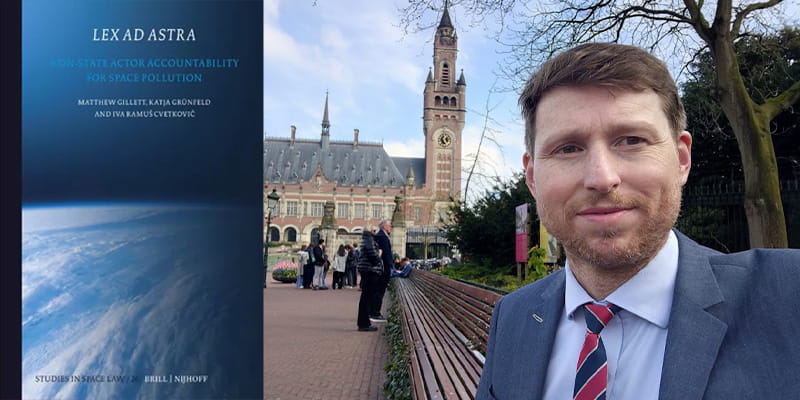Dr Matthew Gillett (alongside Katja Grunfeld, and Iva Ramus Cvetkovič) is co-author of Lex Ad Astra which explores governance in the age of billionaire space tourism and has been published with the support of the University’s Open Access Fund.
Dr Gillett from Essex Law School joined us to discuss his work, Open Access, and the application of “star laws”. The book is freely available to download now.

Congratulations on the publication of your new book! How does it feel to see it published?
3, 2, 1,… lift-off! It’s nice to have it finally out there, as it’s been a few years in the writing. The topic is more timely than ever, as an increasing number of actors launch objects into space.
You chose to make use of the University’s Open Access Fund. Why is open access important to you and how do you think it will benefit your work?
Publishing research has little point if no-one can access it. Open Access ensures that any academic and anyone in the general public will be able to read the work and incorporate it in their own thinking and research. Having the book available Open Access will ensure that it is read as widely as possible, and thereby can contribute to scholarship in the field and, in turn, benefit from feedback and constructive critiques from readers.
How did you find the Open Access process?
The Open Access process was extremely smooth; despite the technical jargon, which is still mystifying when I try to work my way through it.
What advice about Open Access, or publishing in general, would you offer to colleagues?
Look closely at the contract; once you sign, it sets out the governing parameters for the project.
Now, about your book, please give us a quick overview.
The premise is that Space Law was designed during the Cold War, with a State-centric orientation, and that very little accommodation is made for directly regulating the actions of non-State actors. However, we are seeing non-State actors become extremely active in space and this is raising the risk of escalating space pollution. There is even the possibility of space access being effectively cut-off due to exponentially increasing pieces of space debris being caused by collisions and fragmentation, known as the Kessler Syndrome. In that light, the book reviews whether there is a basis in international law to prohibit space pollution and how that prohibition could be applied to non-State actors. In addition to space law, it surveys international environmental law, criminal law, humanitarian law, human rights law, and private law, as well as the domestic laws of all space-faring countries. It’s quite a journey.
How serious is the issue of pollution in space generally, and how much of it results from the activities of non-state actors? Are these companies that offer short trips into orbit or launch telecommunications systems?
Space pollution is an issue of growing seriousness; it shouldn’t be under-estimated. A significant proportion results from the acts of non-State actors; whether operating solely or in conjunction with State entities. Actors that contribute to space pollution can include those engaging in space tourism; but the greater proportion results from launching space objects such as telecommunications satellites into space without proper decommissioning protocols.
Are you confident that international law can – and will – tackle these problems?
International law has a mixed record of addressing collective threats. It has had success in relation to war crimes and crimes against humanity in conflicts such as the former Yugoslavia and Rwanda, but far less in other conflicts such as Russia’s invasion of Ukraine, where high level accused are harder to access. Space exploration is a growing priority for an increasing number of countries; so there is a strong imperative to generate collective solutions. But as we enter an age of unilateralism, it is difficult to assess when international solutions to problems like space pollution will gather momentum.
Who do you think will most benefit from your work and how do you plan to reach them?
United Nations entities and States involved in space regulation will be key recipients of the research. Launches of the book and participation in workshops and conferences will be the platform to access key policy-developers.
What’s next for you?
The subject of space pollution arose from my research on terrestrial pollution on Earth. With the book on international law in space completed, my research will turn back to focusing on ecocide and how this can be best adopted and operationalised in keeping with international law now that it has been formally proposed by Vanuatu, Fiji and Samoa.
Lex Ad Astra: Non-State Actor Accountability for Space Pollution (Brill, 2025) is freely available to download now.
You can read more about Dr Gillett’s work with Katja Grunfeld, from the Institute of Air Law and Space Law and Cyber Law in Cologne, and Iva Ramus Cvetkovič, of the Institute of Criminology in Ljubljana to update space governance in Star Laws: Reform needed to stop final frontier becoming billionaire wasteland (17 March 2025).
The Open Access Fund
The University of Essex's institutional Open Access Fund enables Essex authors to publish their research open access and to share their findings without barriers. You can explore your Open Access options with our dedicated forms: for longform works such as books and chapters, and for articles.








